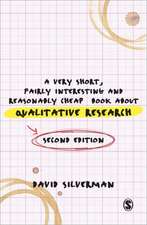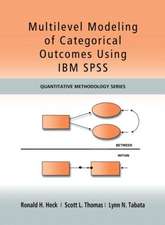Quantitative Psychology Research: The 80th Annual Meeting of the Psychometric Society, Beijing, 2015: Springer Proceedings in Mathematics & Statistics, cartea 167
Editat de L. Andries van der Ark, Daniel M. Bolt, Wen-Chung Wang, Jeffrey A. Douglas, Marie Wibergen Limba Engleză Hardback – 5 aug 2016
| Toate formatele și edițiile | Preț | Express |
|---|---|---|
| Paperback (1) | 781.14 lei 6-8 săpt. | |
| Springer International Publishing – 7 iun 2018 | 781.14 lei 6-8 săpt. | |
| Hardback (1) | 787.26 lei 6-8 săpt. | |
| Springer International Publishing – 5 aug 2016 | 787.26 lei 6-8 săpt. |
Din seria Springer Proceedings in Mathematics & Statistics
- 15%
 Preț: 642.03 lei
Preț: 642.03 lei - 15%
 Preț: 646.62 lei
Preț: 646.62 lei - 18%
 Preț: 727.31 lei
Preț: 727.31 lei - 24%
 Preț: 1236.82 lei
Preț: 1236.82 lei - 9%
 Preț: 624.23 lei
Preț: 624.23 lei - 18%
 Preț: 727.97 lei
Preț: 727.97 lei - 18%
 Preț: 1016.01 lei
Preț: 1016.01 lei - 15%
 Preț: 656.43 lei
Preț: 656.43 lei - 18%
 Preț: 947.35 lei
Preț: 947.35 lei - 15%
 Preț: 646.62 lei
Preț: 646.62 lei - 18%
 Preț: 948.92 lei
Preț: 948.92 lei - 18%
 Preț: 1699.47 lei
Preț: 1699.47 lei - 18%
 Preț: 1120.18 lei
Preț: 1120.18 lei - 15%
 Preț: 644.95 lei
Preț: 644.95 lei - 18%
 Preț: 1233.83 lei
Preț: 1233.83 lei - 18%
 Preț: 1120.18 lei
Preț: 1120.18 lei - 18%
 Preț: 1033.37 lei
Preț: 1033.37 lei - 18%
 Preț: 948.92 lei
Preț: 948.92 lei - 18%
 Preț: 896.08 lei
Preț: 896.08 lei - 18%
 Preț: 1115.46 lei
Preț: 1115.46 lei - 18%
 Preț: 952.09 lei
Preț: 952.09 lei - 18%
 Preț: 1230.66 lei
Preț: 1230.66 lei - 15%
 Preț: 647.59 lei
Preț: 647.59 lei - 18%
 Preț: 1124.92 lei
Preț: 1124.92 lei - 20%
 Preț: 1630.95 lei
Preț: 1630.95 lei - 18%
 Preț: 1123.35 lei
Preț: 1123.35 lei - 18%
 Preț: 950.52 lei
Preț: 950.52 lei - 18%
 Preț: 947.35 lei
Preț: 947.35 lei - 18%
 Preț: 1003.70 lei
Preț: 1003.70 lei - 18%
 Preț: 956.81 lei
Preț: 956.81 lei - 18%
 Preț: 889.75 lei
Preț: 889.75 lei - 18%
 Preț: 1000.24 lei
Preț: 1000.24 lei - 18%
 Preț: 1122.56 lei
Preț: 1122.56 lei - 18%
 Preț: 1005.74 lei
Preț: 1005.74 lei - 18%
 Preț: 950.96 lei
Preț: 950.96 lei - 18%
 Preț: 1009.08 lei
Preț: 1009.08 lei - 18%
 Preț: 1008.91 lei
Preț: 1008.91 lei - 18%
 Preț: 947.35 lei
Preț: 947.35 lei - 18%
 Preț: 1113.89 lei
Preț: 1113.89 lei - 18%
 Preț: 1113.71 lei
Preț: 1113.71 lei - 18%
 Preț: 1400.35 lei
Preț: 1400.35 lei - 18%
 Preț: 969.44 lei
Preț: 969.44 lei - 18%
 Preț: 1401.93 lei
Preț: 1401.93 lei - 18%
 Preț: 948.92 lei
Preț: 948.92 lei - 18%
 Preț: 1392.46 lei
Preț: 1392.46 lei - 20%
 Preț: 878.66 lei
Preț: 878.66 lei - 20%
 Preț: 1002.90 lei
Preț: 1002.90 lei - 18%
 Preț: 1120.99 lei
Preț: 1120.99 lei - 18%
 Preț: 942.63 lei
Preț: 942.63 lei
Preț: 787.26 lei
Preț vechi: 960.07 lei
-18% Nou
Puncte Express: 1181
Preț estimativ în valută:
150.64€ • 157.70$ • 124.65£
150.64€ • 157.70$ • 124.65£
Carte tipărită la comandă
Livrare economică 05-19 aprilie
Preluare comenzi: 021 569.72.76
Specificații
ISBN-13: 9783319387574
ISBN-10: 331938757X
Pagini: 470
Ilustrații: IX, 398 p. 50 illus., 29 illus. in color.
Dimensiuni: 155 x 235 x 24 mm
Greutate: 0.75 kg
Ediția:1st ed. 2016
Editura: Springer International Publishing
Colecția Springer
Seria Springer Proceedings in Mathematics & Statistics
Locul publicării:Cham, Switzerland
ISBN-10: 331938757X
Pagini: 470
Ilustrații: IX, 398 p. 50 illus., 29 illus. in color.
Dimensiuni: 155 x 235 x 24 mm
Greutate: 0.75 kg
Ediția:1st ed. 2016
Editura: Springer International Publishing
Colecția Springer
Seria Springer Proceedings in Mathematics & Statistics
Locul publicării:Cham, Switzerland
Cuprins
Continuation Ratio Model in Item Response Theory and Selection of Models for Polytomous Items.- Using the Asymmetry of Item Characteristic Curves (ICCs) to Learn about Underlying Item Response Processes.- A Three-Parameter Speeded Item Response Model: Estimation and Application.- An Application of a Random Mixture Nominal Item Response Model for Investigating Instruction Effects.- Item Response Theory Models for Multidimensional Ranking Items.- Different Growth Measures on Different Vertical Scales.- Investigation of Constraint-weighted Item Selection Procedures in Polytomous CAT.- Estimating Classification Accuracy and Consistency Indices for Multidimensional Latent Ability.- Item Response Theory Models for Person Dependence in Paired Samples.- Using Sample Weights in Item Response Data Analysis under Complex Sample Designs.- Scalability Coefficients for Two-Level Polytomous Item Scores: An Introduction and an Application.- Numerical Differences Between Guttman's Reliability Coefficients and the GLB.- A Framework for Optimizing the costs and GT based reliabilities in Large-scale Performance.- A Confirmatory Factor Model for the Investigation of Cognitive Data Showing a Ceiling Effect: an Example.- The Goodness of Sample Loadings of Principal Component Analysis in Approximating to Factor Loadings with High Dimensional Data.- Remedies for Degeneracy in Candecomp/Parafac.- Growth Curve Modeling for Nonnormal Data: A Two-stage Robust Approach versus a Semiparametric Bayesian Approach.- The Specification of Attribute Structures and Its Effects on Classification Accuracy in Diagnostic Test Design.- Conditions of Completeness of the Q-Matrix of Tests for Cognitive Diagnosis.- Application Study of Online Multistage Intelligent Adaptive Testing for Cognitive Diagnosis.- Dichotomous and Polytomous Q Matrix Theory.- Multidimensional Joint Graphical Display of Symmetric Analysis: Back to the Fundamentals.- Classification of Writing Patterns Using Keystroke Logs.- Identifying Useful Features to Detect Off-Topic Essays in Automated Scoring Without Using Topic-Specific Training Essays.- Students’ Perceptions of Their Mathematics Teachers in the Longitudinal Study of American Youth (LSAY): A Factor Analytic Approach.- A Study on Factors Influence Chinese Elementary School Teachers’ Job Satisfaction.- The Determinants of Training Participation, A Multilevel Approach: Evidence from PIAAC.- Latent Transition Analysis for Program Evaluation with Multivariate Longitudinal Outcomes.- The Theory and Practice of Personality Development Measurement.
Textul de pe ultima copertă
The research articles in this volume cover timely quantitative psychology topics, including new methods in item response theory, computerized adaptive testing, cognitive diagnostic modeling, and psychological scaling. Topics within general quantitative methodology include structural equation modeling, factor analysis, causal modeling, mediation, missing data methods, and longitudinal data analysis. These methods will appeal, in particular, to researchers in the social sciences. The 80th annual meeting took place in Beijing, China, between the 12th and 16th of July, 2015. Previous volumes to showcase work from the Psychometric Society’s Meeting are New Developments in Quantitative Psychology: Presentations from the 77th Annual Psychometric Society Meeting (Springer, 2013), Quantitative Psychology Research: The 78th Annual Meeting of the Psychometric Society (Springer, 2015), and Quantitative Psychology Research: The 79th Annual Meeting of the Psychometric Society, Wisconsin, USA, 2014 (Springer, 2015).
Caracteristici
Contains the latest work in measurement and statistics within psychology Covers a broad range of topics with applications in psychology, education and throughout the social sciences Fourth in a series of recent volumes to cover research presented at the Annual Meetings of the Psychometric Society Includes supplementary material: sn.pub/extras


















